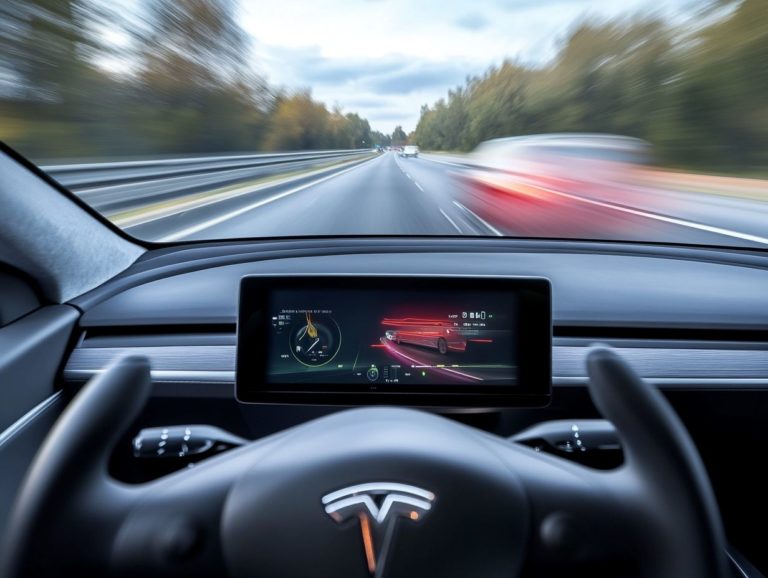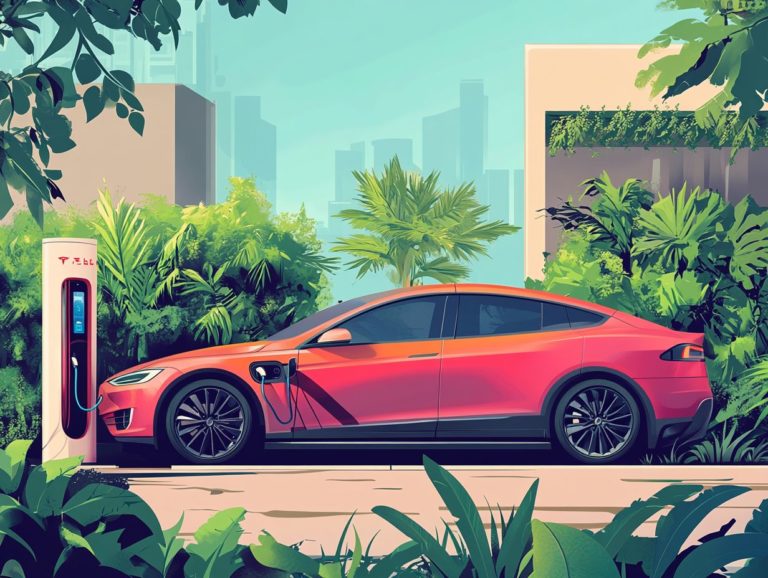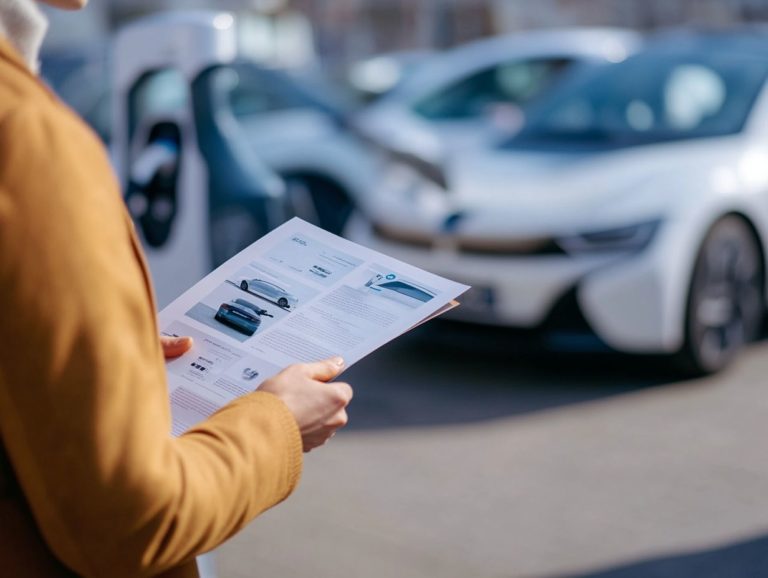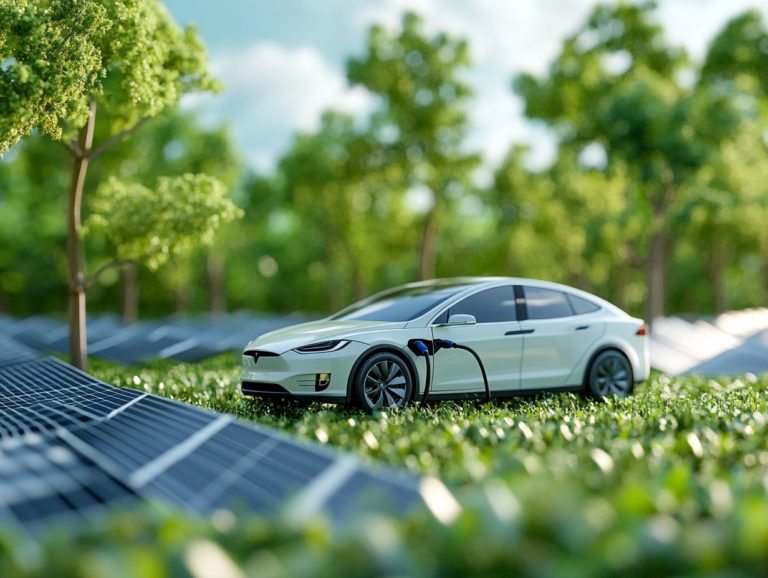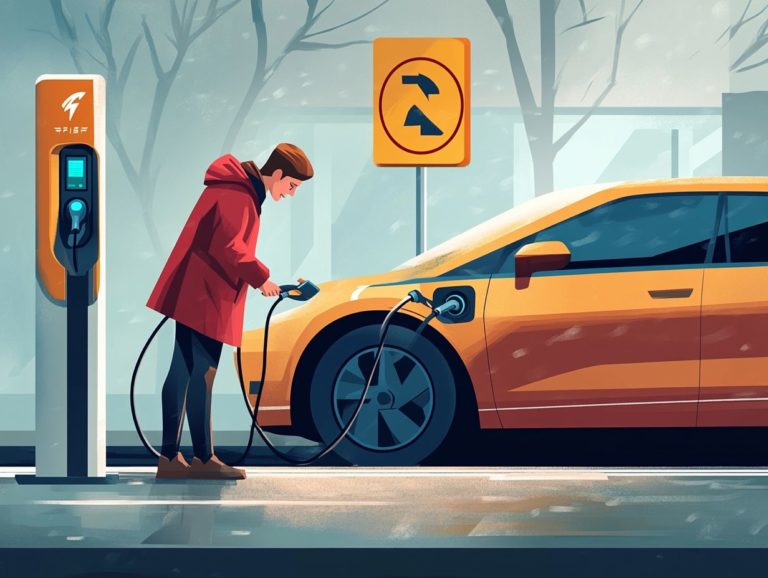How Do I Track My EV’s Energy Consumption?
As electric vehicles (EVs) gain popularity, grasping energy consumption becomes essential for you. This guide delves into various methods for tracking your energy use, ranging from onboard systems to handy third-party apps.
You ll uncover the key factors that influence energy consumption, including your driving habits and the maintenance of your vehicle. By exploring the benefits of effective tracking, such as enhanced efficiency and cost savings, you’ll also find valuable tips for accurately monitoring your EV’s energy usage.
Join us to unlock the secrets of making the most out of your electric vehicle!
Contents
- Key Takeaways:
- Understanding Energy Consumption in Electric Vehicles
- Methods for Tracking Energy Consumption
- Factors Affecting Energy Consumption
- Benefits of Tracking EV Energy Consumption
- Tips for Accurately Tracking Energy Consumption
- Frequently Asked Questions
- What is energy consumption tracking for an EV?
- Why is it important to track my EV’s energy consumption?
- How can I track my EV’s energy consumption?
- Do I need any special equipment to track my EV’s energy consumption?
- Can I track my EV’s energy consumption in real-time?
- What can I do with the information gathered from tracking my EV’s energy consumption?
Key Takeaways:
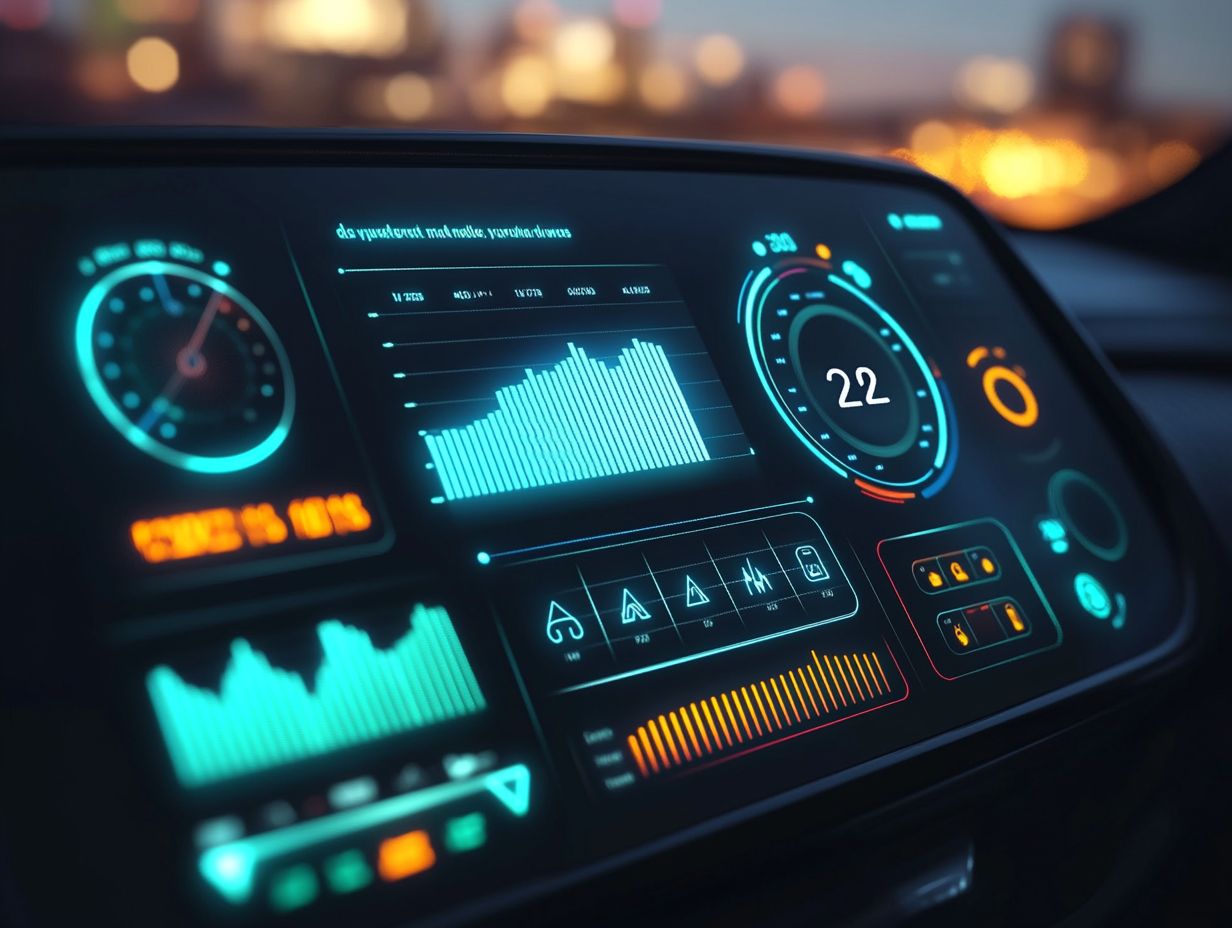
- Monitor energy consumption through onboard systems or third-party apps to track your EV’s efficiency and range.
- Consider factors like driving habits, the environment, and vehicle maintenance that impact energy use.
- Tracking energy use leads to improved efficiency, cost savings, and helps the environment.
Understanding Energy Consumption in Electric Vehicles
Understanding energy consumption in electric vehicles (EVs) is essential, as it significantly influences your charging habits, efficiency, and overall performance.
By monitoring energy use, you can optimize your charging sessions, which helps save money, improve performance, and understand your energy use better.
With cutting-edge technologies like telemetrics (a system that collects data about your vehicle s performance) and energy monitoring tools at your disposal, you gain real-time insights into your vehicle’s energy consumption patterns.
This gives you the power to make informed decisions regarding your charging sessions and home energy management, ensuring a seamless and efficient EV experience.
Methods for Tracking Energy Consumption
Tracking energy consumption in your electric vehicle can be accomplished through a variety of simple ways. You can utilize onboard energy tracking systems or opt for third-party energy tracking apps, both of which offer you invaluable data metrics regarding your charging sessions and expenses.
These approaches not only elevate your energy management but also streamline the process of tracking costs, whether you prefer organizing them in a CSV spreadsheet or using smart charging options that connect with your device.
Onboard Energy Tracking Systems
Onboard energy tracking systems in electric vehicles are essential for monitoring your energy consumption, providing you with real-time data on your vehicle’s status and charging progress. These systems leverage telemetrics to assess the efficiency of your charging sessions, giving you valuable insights into your energy use and the costs tied to your EV’s charging equipment.
By offering detailed analytics, these systems also provide you with the tools needed to make informed decisions about your driving habits and charging routines. For example, you can identify peak consumption times and optimize your charging schedule to take advantage of lower electricity rates, ultimately leading to significant cost savings. The integration of these systems reveals patterns in energy use, contributing to improved overall vehicle performance.
Not only does onboard energy tracking enhance your experience, but it also assists manufacturers in refining their technologies, paving the way for more efficient electric vehicles for future generations.
Third-Party Energy Tracking Apps
Third-party energy tracking apps have become essential tools for electric vehicle owners like you, empowering you to manage your energy consumption with finesse and keep a close eye on your charging expenses. These smartphone apps provide you with real-time insights into your charging habits, enabling you to optimize your energy management and enjoy significant cost savings over time.
With a range of features such as customizable dashboards, location-based charging station mapping, and detailed performance metrics, these applications elevate your user experience. They empower you to visualize your energy usage patterns, promoting more mindful consumption. Many of these apps even offer predictive analytics, allowing you to estimate future costs based on your driving habits and fluctuating energy prices.
You can set alerts to remind you when to charge your vehicle, ensuring you capitalize on lower rates or maximize the efficiency of your energy source. Ultimately, this awareness helps you make greener choices while cutting down on expenses.
Factors Affecting Energy Consumption
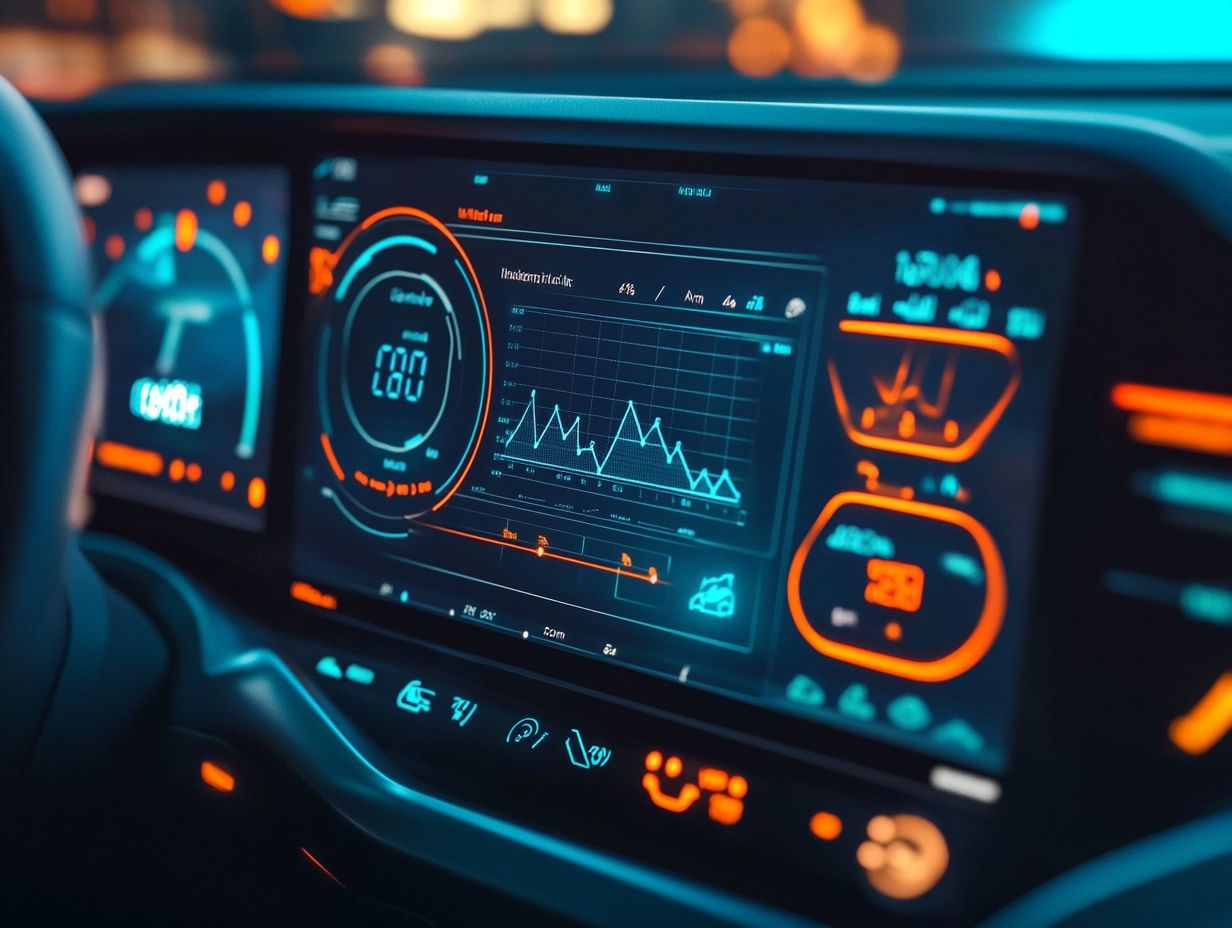
Numerous factors impact energy consumption in electric vehicles, including your driving habits, the maintenance of your vehicle, and the efficiency of your charging setup. Understanding these influences is essential for you as an EV owner, empowering you to minimize charging costs and optimize your energy use during both regular driving and charging sessions.
Driving Habits and Environment
Your driving habits play a crucial role in affecting both your vehicle’s efficiency and the environmental impact of your EV usage. Factors like your acceleration patterns, speed, and even the routes you choose can lead to significant variations in energy usage, highlighting the importance of mindful driving to optimize overall efficiency.
When assessing these habits, consider metrics such as the effectiveness of braking that helps recharge your battery, energy consumption per mile, and your overall driving range. For instance, by maintaining a steady speed, you can conserve battery life, whereas aggressive acceleration might drain your energy reserves by as much as 30%.
Weather and terrain also affect energy efficiency. For example, navigating steep hills or driving on a windy day demands more energy, emphasizing the need to adjust your driving techniques based on your habits and external conditions.
Vehicle Maintenance and Efficiency
Regular vehicle maintenance is essential for optimizing energy consumption in your electric vehicle, as it directly influences both efficiency and charging rates. By ensuring that your charging setup is in top shape and that all components are functioning optimally, you can significantly reduce energy waste and enhance your vehicle’s overall performance.
Routine checks like monitoring tire pressure, brake fluid levels, and battery health are crucial for maintaining peak performance. Don t wait! Neglecting these practices can lead to unnecessary energy losses and longer charging sessions, driving up your operational costs.
For instance, keeping your tires properly inflated not only maximizes your range but also minimizes rolling resistance, allowing your battery to work more efficiently. Additionally, maintaining clean and corrosion-free battery terminals promotes better energy flow, ensuring you get the most out of your drives and charging sessions.
By following these straightforward maintenance tips, you can enjoy a more economical and eco-friendly driving experience.
Benefits of Tracking EV Energy Consumption
Tracking energy consumption in electric vehicles provides you with a wealth of benefits, such as enhanced efficiency, significant cost savings, and a positive impact on the environment.
By gaining a deeper understanding of your energy usage, you can make informed, data-driven decisions about your charging sessions. This allows you to implement smart charging solutions that align seamlessly with your consumption patterns, optimizing both performance and sustainability.
Start tracking today to save money!
Improving Efficiency and Range
Enhancing the efficiency and range of your electric vehicle relies on effectively tracking your energy consumption and adjusting your charging habits. Use smart energy techniques to boost your range and keep energy use efficient.
To achieve these goals, regularly monitor your driving patterns. Identify habits that lead to unnecessary energy waste, such as aggressive acceleration or excessive idling. Adjust your charging times to take advantage of lower electricity rates. Also, using systems that adjust charging times for cost savings can supercharge your vehicle’s performance!
Engaging in regular maintenance checks also enhances efficiency. This ensures that all systems are functioning optimally. By adopting these strategies, you can extend your driving range while contributing to a more sustainable future.
Cost Savings and Environmental Impact
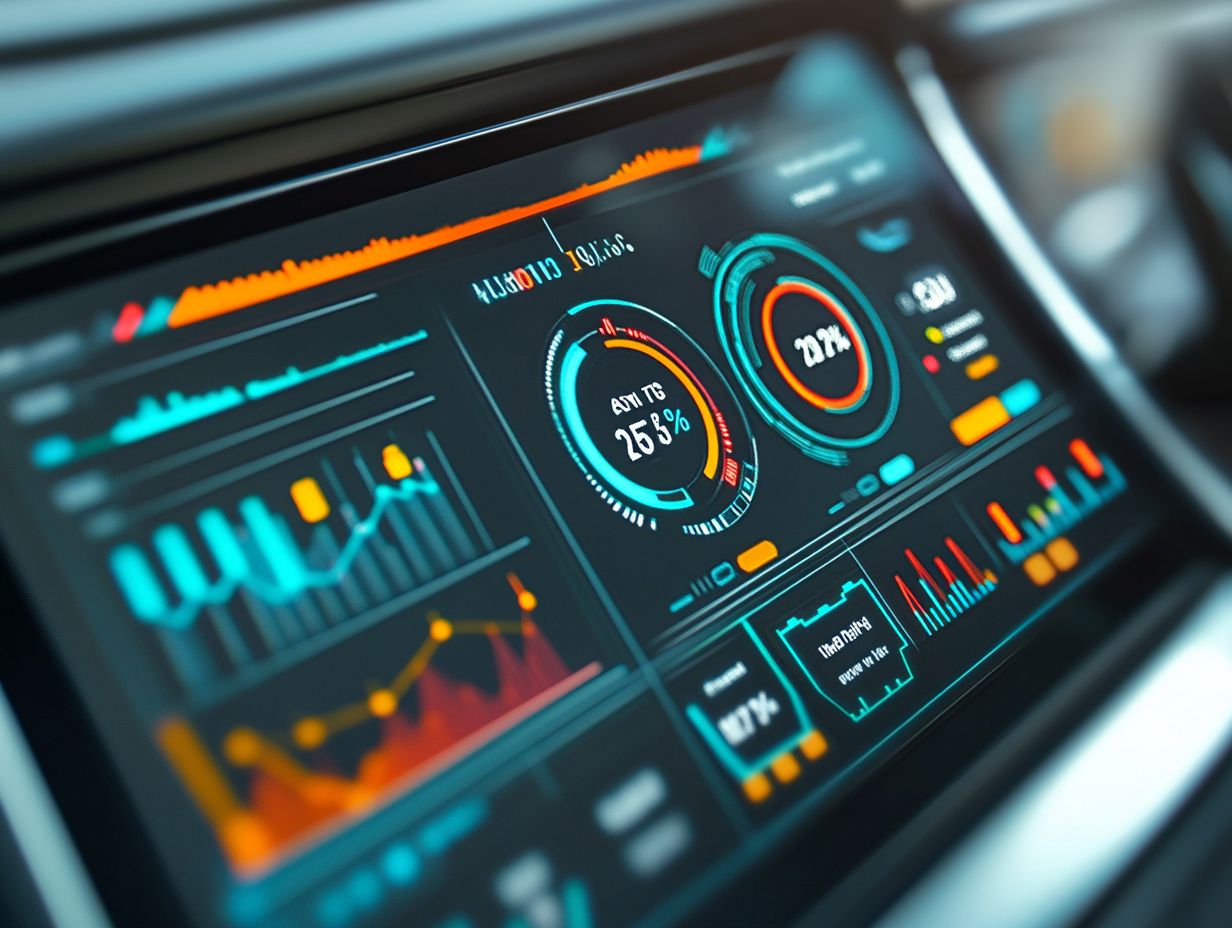
Cost savings and environmental impact are two significant advantages of tracking energy consumption in electric vehicles. By understanding and managing your energy use, you can lower your charging expenses while reducing your carbon footprint.
For example, studies show that optimizing your charging times to align with off-peak electricity rates can save you up to 30% on your energy bills. Being mindful of your charging practices and minimizing unnecessary energy drain can further cut costs.
Beyond your individual savings, these practices contribute to wider environmental benefits. Reduced energy consumption correlates with fewer emissions from power plants, especially those that rely on fossil fuels. According to the EPA, the shift to electric vehicles could potentially reduce greenhouse gas emissions by up to 70% by 2050. This creates a dual opportunity: saving money while making a meaningful contribution to global sustainability efforts.
Tips for Accurately Tracking Energy Consumption
To accurately track energy consumption in electric vehicles, adhere to best practices that ensure reliable data collection and effective energy monitoring.
By implementing these proven strategies, you can elevate your energy awareness and optimize the efficiency of your charging sessions.
Top Tips for Tracking Your Energy Use Effectively
Monitoring and recording data related to energy consumption in electric vehicles is crucial for ensuring accuracy and consistency. By adopting a systematic approach to energy tracking, you can maintain detailed expense reports and gain a clearer understanding of your energy usage.
Regular routine checks are essential. These checks empower you to identify any discrepancies or irregularities in your energy consumption over time. Utilizing advanced software tools for energy monitoring enhances your tracking precision and provides valuable insights through data analytics.
Integrating smart metering systems simplifies documentation, allowing you to capture detailed readings effortlessly. By cultivating the habit of thorough documentation, you deepen your awareness of energy consumption patterns and optimize your driving habits, resulting in more economical use of energy resources.
Frequently Asked Questions
What is energy consumption tracking for an EV?
Energy consumption tracking for an EV is the process of monitoring and recording the amount of energy used by your electric vehicle.
Why is it important to track my EV’s energy consumption?
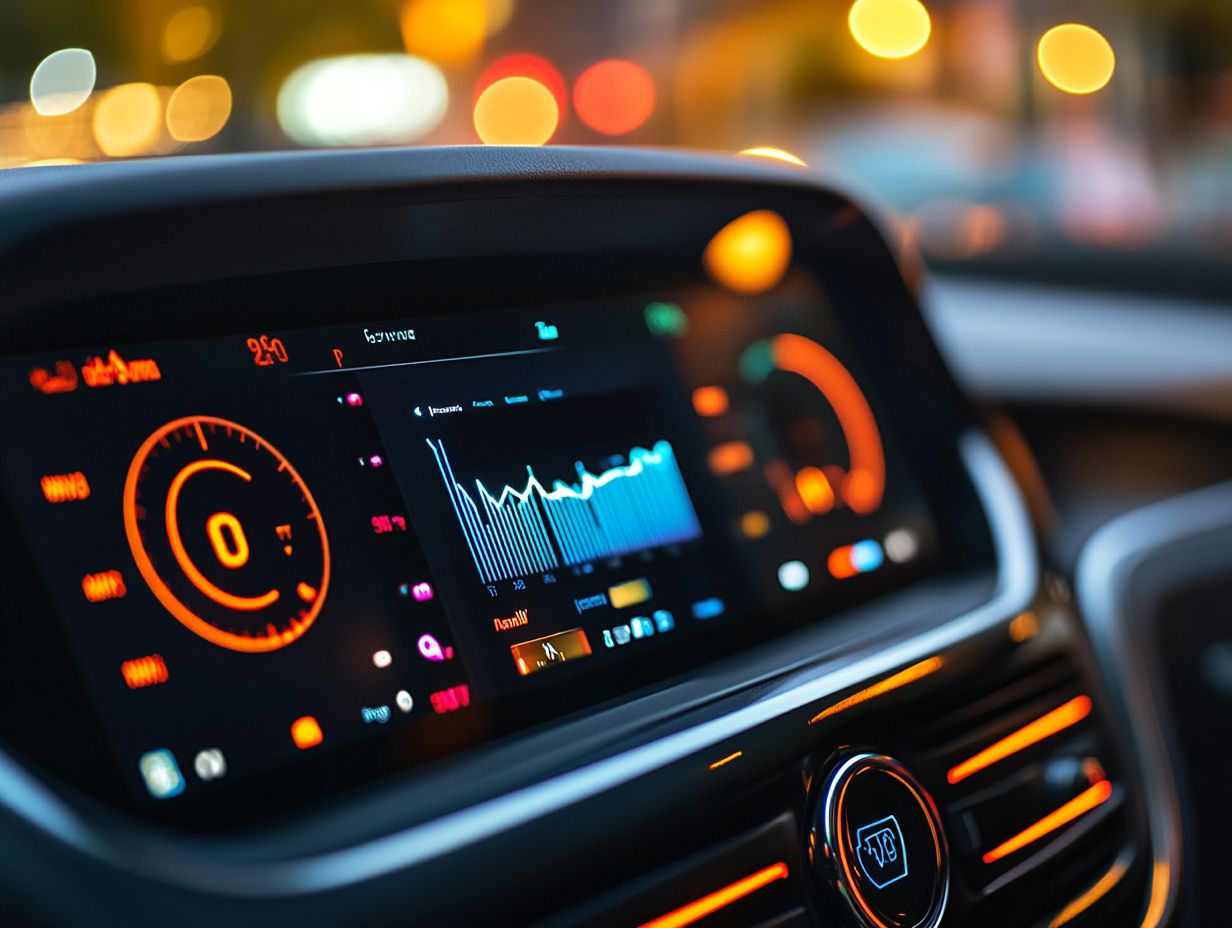
Tracking your EV’s energy consumption allows you to understand how much energy your vehicle uses, enabling you to make adjustments for optimal performance and efficiency.
How can I track my EV’s energy consumption?
There are several ways to track your EV’s energy consumption, including using the vehicle’s onboard energy monitoring system, specialized apps, or third-party energy tracking devices.
Start tracking your energy consumption today for a better driving experience!
Do I need any special equipment to track my EV’s energy consumption?
It depends on your chosen method. Some EVs have built-in tracking features, while others may need an app or device.
Can I track my EV’s energy consumption in real-time?
Yes! Some tracking methods let you see your EV’s energy use instantly. This means you get immediate and accurate data.
What can I do with the information gathered from tracking my EV’s energy consumption?
The data you gather can empower you to make smart choices. You can adjust your driving habits and charging schedule to maximize efficiency and cut costs.

